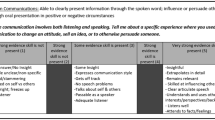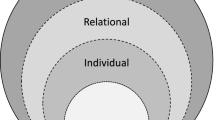Abstract
The authors sought to develop recommendations regarding the optimal balance of psychiatric residency training activities. University of Toronto residents completed a weeklong time-log of their daytime training activities. Staff and resident focus groups were asked to comment on the data from this survey and on the variables that affect successful introduction of new requirements into psychiatric residency. In a large multicenter training program, supervised clinical experience was found to be the most valuable training activity, especially when accurate and specific feedback is provided.
Similar content being viewed by others
References
Cawley RH: Educating the psychiatrist of the 21st century. Br J Psychiatry 1990; 157: 174–181
Langsley DG, Yager J: The definition of a psychiatrist: eight years later. Am J Psychiatry 1988; 145: 469–475
Yager J, Borus JF, Robinowitz CB, et al: Developing minimal national standards for clinical experience in psychiatric training. Am J Psychiatry 1988; 145: 1409–1413
Brook P: Is psychiatric training still improving? Br J Psychiatry 1990; 157: 335–338
Prosen H: Editorial: Key issues in postgraduate psychiatric education in Canada. Can J Psychiatry 1986; 31: 703–704
Task Force to Review Fundamental Issues in Specialty Education: Fundamental issues in specialty education. Annals of the RCPSC 1996; 29: 272–277
Armstrong PW, Cairns JA, Carruthers SG, et al: Canadian academic departments of medicine amid health-care reform. Annals of the RCPSC 1997; 30: 279–282
Hohagen F, Lindhardt A: Training in psychiatry: a European perspective. Eur Arch Psychiatry Clin Neurosci 1997; 247(suppl 1): S1–S2
Paris J, Kravitz H, Prince R: Report: Conference on Key Issues in Postgraduate Education in Canada. Can J Psychiatry 1986; 31: 705–707
Krueger RA: Focus Groups: A Practical Guide for Applied Research, 2nd Edition. Thousand Oaks, CA, Sage Publications, 1994
Spitzer RL, Gibbon M, Skodol A, et al (eds): DSM-IV Casebook. Washington, DC, American Psychiatric Press, Inc., 1994
Maudsley RF: Service and education in postgraduate medical education: striking a proper balance. Can Med Assoc J 1986; 135: 449–453
Wallace EZ: Service vs. education in internal medicine residency: need for a solution. Arch Intern Med 1988; 148: 1296
Leichner P, Harper D: Profile of the ideal residency program in psychiatry: the Canadian resident’s viewpoint. Journal of Psychiatric Education 1981; 5: 269–277
Kozlowska K, Nunn K, Cousens P: Adverse experience in psychiatric training: part 2: Aust N Z J Psychiatry 1997; 31: 641–652
Alonso A: What is supervision? in The Quiet Profession: Supervisors of Psychotherapy. New York, Macmillan, 1985, pp 9–24
Shanfield SB, Matthews KL, Hetherly V: What do excellent psychotherapy supervisors do? Am J Psychiatry 1993; 150: 1081–1084
Robertson DL: Facilitating transformative learning: attending to the dynamics of the educational helping relationship. Adult Education Quarterly 1996; 47: 41–53
Davis LL, Little MS, Thornton WL: The art and angst of the mentoring relationship. Academic Psychiatry 1997; 21: 61–71
Hayward RSA, Rockwood K, Sheehan GJ, et al: A phenomenology of scut. Ann Intern Med 1991; 151: 372–376
Swenson JR, Boyle A, Last J, et al: Mentorship in medical education. Annals of the RCPSC 1995; 28: 165–169
Daugherty SR, Baldwin DC, Rowley BD: Learning, satisfaction, and mistreatment during medical internship: a national survey of working conditions. JAMA 1998; 279: 1194–1199
Betcher RW, Zinberg NE: Supervision and privacy in psychotherapy training. Am J Psychiatry 1988; 145: 796–803
Oddone E, Guarisco S, Simel D: Comparison of housestaff’s estimates of their workday activities with results of a random work sampling study. Acad Med 1993; 68: 859–861
Author information
Authors and Affiliations
Corresponding author
Additional information
This work was completed at the University of Toronto, Department of Psychiatry, Toronto, Ontario, and presented at the 47th Annual Meeting of the Canadian Psychiatric Association, September 17th, 1997, Calgary, Alberta, Canada.
We received unrestricted educational grants from Solvay-Kingswood and Pfizer for Phase I and a peer-reviewed grant for Phase II from the University Health Network Department of Psychiatry.
Thank you to Drs. L. Andermann, W.P. Fleisher, N. Herrmann, and A. Kaplan for their comments.
Rights and permissions
About this article
Cite this article
de Groot, J., Tiberius, R., Sinai, J. et al. Psychiatric Residency. Acad Psychiatry 24, 139–146 (2000). https://doi.org/10.1176/appi.ap.24.3.139
Published:
Issue Date:
DOI: https://doi.org/10.1176/appi.ap.24.3.139




